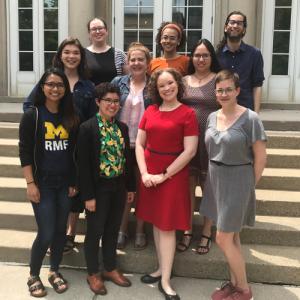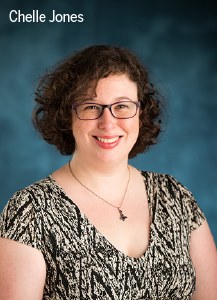Graduate Student Spotlight: 2019 IRWG/Rackham Community of Scholars


For more than two decades, IRWG and the Rackham Graduate School have partnered to offer a unique summer fellowship for graduate students. The Community of Scholars (COS) fellowship provides summer funding combined with a weekly seminar to support interdisciplinary feminist scholarship among PhD candidates. In 2019, ten students from fields across the humanities, social sciences, public health, and education were awarded the highly competitive fellowship.
Three students sat down to discuss their research projects and their experiences in the summer COS seminar, which was facilitated by Victor Mendoza, Associate Professor of English and Women’s Studies.
 Kamaria Porter
Kamaria Porter
Kamaria Porter, a PhD candidate in Higher Education, is seeking to understand how universities respond to sexual violence on campus, how those responses can be more equitable, and how research might motivate and assist students—the constituency that pushes for social change—in their movements to transform university policies and practices. Following a path from community organizer in Chicago, to rape crisis counselor and victim advocate, and then to graduate studies here at U-M, Kamaria is passionate about using research to answer big questions and effect positive change.
In addition to her own dissertation, Kamaria is also working on a mixed methods research project based in the Sociology Department. They are examining how universities respond to sexual violence. She notes, “One of the big questions we get on how schools are responding: is ‘what works? What’s a good policy?’ The answer is that we don’t know because what works for survivors isn’t necessarily a universal answer. . .what works for survivors who already feel marginalized?” This is where her own work comes in.
Her dissertation aims to understand what factors influence Black and White women’s decisions to report sexual violence to their university. She’s interviewing women students who have experienced sexual violence while in college or in graduate school. Through these case studies, she hopes to understand “the intersectional consequences of sexual violence on campus, how students experience those consequences, and how they perceive the legal system and Title IX processes.” Using conceptual frameworks from Black Feminist Thought and socio-legal studies helps her to frame survivors’ experiences as part of a larger examination of power dynamics within overlapping systems of oppression, including gender and race.
Kamaria found the Community of Scholars seminar, which met weekly in May and June, “really valuable.” Each week, two scholars would submit a piece of their writing—often a chapter from their dissertation, and everyone would read and give feedback. “Seeing another person’s work can help you reflect on how to improve your own work,” she explained. “I definitely got a better perspective on ways to tighten up theory, and methods, [and learned about] authors I hadn’t read yet.” Once graduate students are writing their dissertations, they may feel disconnected from the rest of their departmental cohort, as everyone is working individually on their research. The Community of Scholars seminar provides a space for students who are at similar stages to connect and provide support. “Three of us [presenting together at the COS symposium] really found some neat synergy between our topics,” says Kamaria, “I’m very grateful to be a part of COS.”
* * *
Traci Carson
 Traci Carson, a PhD candidate in Epidemiology at the School of Public Health, is also using research to effect change. A former college athlete, Traci’s research looks at the Female Athlete Triad, a medical condition consisting of low energy availability (due to low calorie diets) and irregular menstrual cycles, which leads to low bone mineral density. She wants to address gaps in understanding about how cultural norms, messaging, and dietary practices impact women athletes’ physical and psychological health. College women athletes, she explains “face the pressure to be an athlete but also to be a female in our society.” Cultural narratives around body image “influence the way they eat and think about their body,” which can lead to restricting calorie intake through dieting, or over-exercising. This, combined with the physical demands of high-intensity athletic training, puts women athletes at risk for mental and physical health problems.
Traci Carson, a PhD candidate in Epidemiology at the School of Public Health, is also using research to effect change. A former college athlete, Traci’s research looks at the Female Athlete Triad, a medical condition consisting of low energy availability (due to low calorie diets) and irregular menstrual cycles, which leads to low bone mineral density. She wants to address gaps in understanding about how cultural norms, messaging, and dietary practices impact women athletes’ physical and psychological health. College women athletes, she explains “face the pressure to be an athlete but also to be a female in our society.” Cultural narratives around body image “influence the way they eat and think about their body,” which can lead to restricting calorie intake through dieting, or over-exercising. This, combined with the physical demands of high-intensity athletic training, puts women athletes at risk for mental and physical health problems.
Part of Traci’s dissertation includes interviews with women long-distance runners in Division 1 college sports programs. While qualitative research is not common in her field, she is passionate about including it in her project. “I feel like stories are so powerful,” she explains, “. . .being able to put together this narrative about the experiences of this group of women in a way that’s not just a number and a percent sign. . .Their quotes can evoke emotion from personal experience that stats can’t do.” The next phase of her research will involve quantitative data collection through surveys of long-distance runners from collegiate programs across the country. Traci was also awarded an IRWG Boyd Williams Dissertation Grant in 2019, which provided funds to hire two research assistants for the summer to assist with her primary data collection.
As a Community of Scholars fellow, she received feedback and support in crafting the introduction and background sections of her manuscript, and was also reaffirmed in her committment to using a feminist approach to her work. “After this fellowship, it’s become clearer and clearer that I was approaching my work from a feminist [perspective], but I lacked the vocabulary. After this summer, I had other fellows sending me literature and resources that I didn’t previously have access to. Now I have the tools to pull from, and I am informed by feminist theory. It inspired me to stay true to that intent.”
* * *
Chelle Jones
 Chelle Jones, a PhD candidate in Sociology, studies how lesbian, bisexual, queer and transgender skilled laborers use migration to South Korea to assemble resources to build families, achieve socioeconomic mobility and affirm their identities. Chelle explains the unique aspect of their work: “Most research around LBTQ migration tends to focus on western ‘destination’ countries, such as Europe or North America. I wanted to reverse that by interviewing a group of people from several world regions who travel to Asia.” Chelle has a long history of working and studying in South Korea, where homosexuality is neither criminalized, nor protected through same-sex relationship rights or anti-discrimination policies. Their research explicity focuses on lesbian, bisexual, transgender, and queer people (LBTQ), choosing to omit cisgender gay men “because there’s already a lot of amazing research on the migration of cisgender gay men.” Instead, Chelle looks at the distinctive experiences of migrants who are sexual-orientation or gender-identity minorities.
Chelle Jones, a PhD candidate in Sociology, studies how lesbian, bisexual, queer and transgender skilled laborers use migration to South Korea to assemble resources to build families, achieve socioeconomic mobility and affirm their identities. Chelle explains the unique aspect of their work: “Most research around LBTQ migration tends to focus on western ‘destination’ countries, such as Europe or North America. I wanted to reverse that by interviewing a group of people from several world regions who travel to Asia.” Chelle has a long history of working and studying in South Korea, where homosexuality is neither criminalized, nor protected through same-sex relationship rights or anti-discrimination policies. Their research explicity focuses on lesbian, bisexual, transgender, and queer people (LBTQ), choosing to omit cisgender gay men “because there’s already a lot of amazing research on the migration of cisgender gay men.” Instead, Chelle looks at the distinctive experiences of migrants who are sexual-orientation or gender-identity minorities.
With support from various units, including the Rackham Merit Fellows program, the Nam Center for Korean Studies, CEW+ Scholars program, as well as a Fulbright dissertation research grant and FLAS funding, Chelle spent 16 months conducting ethnographic fieldwork in South Korea. While “a lot of migration research focuses on people from one world region heading to another world region,” Chelle’s project includes individuals and couples from various regions of the world who migrate to South Korea. This provides a broad scope for understanding the experiences of LBTQ migrants and how they navigate legal statuses, access to healthcare such as gender identity affirmation and fertility treatments, and professional opportunities like building business and career credentials.
“LGBTQ people all over the world still experience very fragmented citizenship. Even if the laws are in place to affirm all of their rights, it’s often the case that the resources are still lacking, or they struggle to afford certain things that will help them live a fuller life. Or, maybe they live in an area that is less LGBTQ friendly,” Chelle explains. “The ways that lesbian, bisexual, queer, and transgender people from all over the world are using migration as a strategy for coping with some of those challenges really fascinates me. I’m really grateful to the community in South Korea that shared what’s going on in their lives.”
The Community of Scholars fellowship gave Chelle an opportunity to get feedback on the introduction to their dissertation, and how they frame their South Korean case study. “Victor Mendoza did an amazing job, right from the start, building a community among us,” says Chelle, “which made it a very comfortable place to be vulnerable with our unpolished work, to trust each other to give rigorous and critical feedback—it was great.” This year, Chelle will co-facilitate a new LGBTQ affinity group for graduate students in the Sociology Department. They hope the new group will provide another source for connection and inclusion among graduate students within and across departments.
The Community of Scholars fellows present their work an annual symposium. This year's symposium will take place Friday, October 25, 2019. Learn more.
